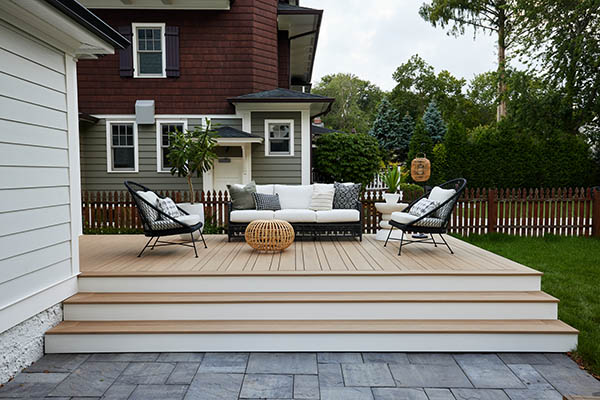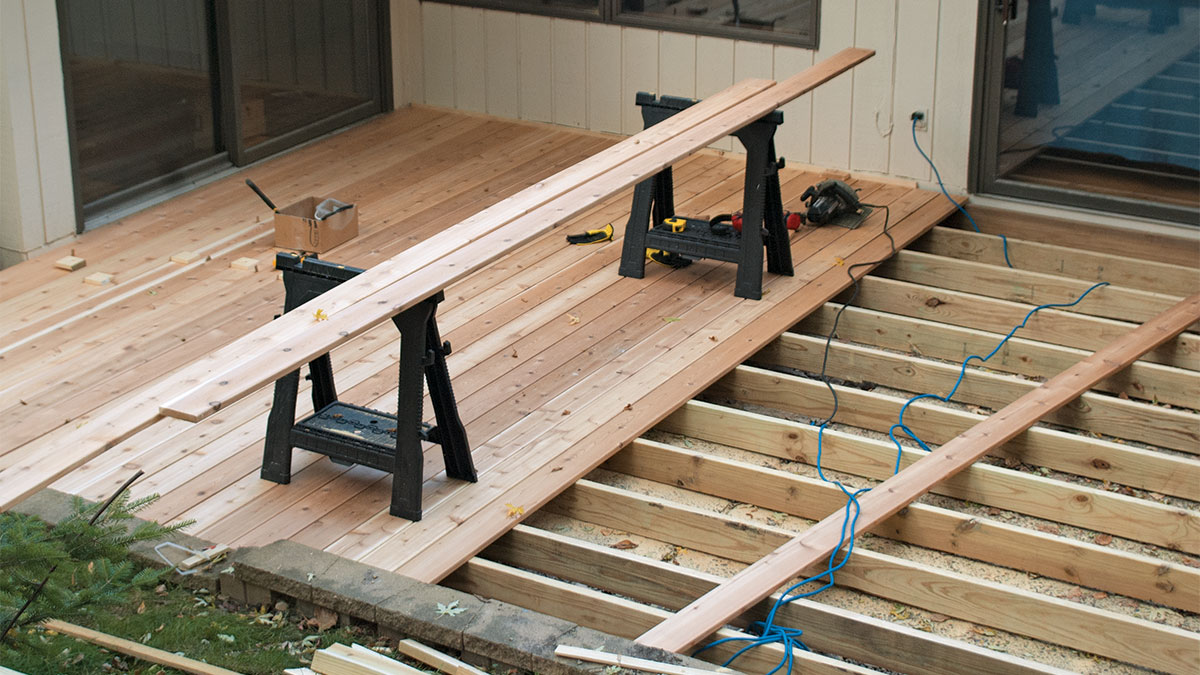Exactly how to Select the Right Materials for Your Deck Installation Project
Picking the proper products for your deck installment job can seem overwhelming. The secret is to stabilize your budget, layout choices, and way of life needs to produce a deck that will enhance your outdoor space for years to come.
Comprehending the Different Kinds Of Deck Products
When beginning on a deck setup job, the selection of materials comes to be a crucial choice. Compound products, on the other hand, are a blend of wood and plastic, offering toughness and resistance to weather elements. By understanding these distinctions, property owners can make a much more enlightened decision on the most suitable deck material for their particular requirements.
Assessing the Resilience and Maintenance Needs of Deck Materials
Assessing the toughness and upkeep demands of deck products is a crucial action in deck installation. Toughness involves the product's capability to endure harsh climate condition, wear and tear, and its long life. Cedar and redwood are normally resistant to rot and pests, making them resilient selections. On the other hand, pressure-treated wood, while sturdy, might require even more upkeep because of its sensitivity to fracturing and warping.
Comprehending maintenance demands is just as important. Some materials need routine securing or discoloring to keep their look and withstand moisture damages, while others, like composite decking, require much less upkeep. By evaluating these variables, one can choose the most ideal outdoor decking product, ensuring an equilibrium in between longevity, maintenance demands, and aesthetic charm.
Expense Evaluation: Comparing Timber and Composite Decking
Although price may originally appear like a secondary worry, it is a significant element when contrasting wood and composite decking. Timber, usually a less costly option, has a lower ahead of time cost. Nevertheless, over time, upkeep expenditures can collect, potentially making wood much more expensive in the long run. These upkeep prices might consist of discoloration, securing, or changing damaged boards. On the various other hand, composite outdoor decking, while pricier originally, requires much less upkeep, possibly decreasing long-lasting prices. Yet, it's important to bear in mind that composite outdoor decking isn't unsusceptible deterioration, and replacement expenses can be high. Therefore, possible deck owners should consider their budget plan and desire to maintain their decks when determining between wood and composite outdoor decking.
Aesthetic Appeals and Design Adaptability of Decking Products
While expense is an important consideration, the visual charm and style flexibility of decking materials likewise play a substantial function in the decision-making procedure. Various materials use differing levels of visual appeal. For instance, all-natural wood outdoor decking provides a timeless, timeless look, while composite materials offer a wide variety of shades and structures to suit diverse tastes and designs. Likewise, layout flexibility refers to the capacity to form and adjust the outdoor decking product to satisfy certain layout demands. Wood, as an example, provides high style flexibility as a result of its simplicity of reducing and forming. Composite products, while less flexible in layout, are still adaptable enough for many deck designs. These factors, consequently, are critical factors in the selection of decking product.
Ecological Effect of Decking Materials
When picking decking materials, one should think about not only aesthetic appeals and durability, but additionally the ecological effect. It's essential to examine the sustainability of materials and check out recycled decking choices. Furthermore, comprehending the possible effect on neighborhood ecosystems will ensure a much more ecologically accountable selection.
Assessing Product Sustainability
In the realm of deck building, examining material sustainability is a crucial action. Composite decking products often integrate wood and plastic, reducing the need for new wood yet enhancing reliance on fossil fuels - deck installation. Hence, the option of outdoor decking products should balance functionality, visual appeals, cost, and sustainability to make sure a responsible and lasting installation.
Recycled Decking Alternatives

Compound decking is particularly preferred due to its toughness and simplicity of maintenance. It's immune to rot, bugs, and fading, making it a durable option. Recycled plastic outdoor decking, on the various other hand, find more info is highly durable and requires marginal maintenance. While these products may bring a higher initial expense, their long life and reduced ecological influence make them a sensible financial investment for the eco-conscious house owner.

Influence On Local Environments
While the benefits of utilizing recycled materials for outdoor decking can not be overemphasized, it's equally crucial to take into consideration the more comprehensive ecological implications of these options. Proper disposal of old outdoor decking is vital to minimizing landfill waste. Essentially, an eco-conscious deck project demands mindful product selection, sustainable sourcing, and responsible check this disposal.
Making Your Decision: Tips for Choosing the Ideal Deck Materials
As the short article shifts right into the subtopic of "Making Your Decision: Tips for Picking the most effective Deck Products", it is important to recognize the variety of deck materials available. Striking a balance between longevity and looks is necessary in this choice process. The complying with discussion will certainly guide readers in making an enlightened choice based upon these key considerations.
Understanding Various Deck Products
The task of picking the best materials for your deck installation can seem intimidating as a result of the large range of choices available. Understanding the different products can simplify this procedure. Timber is a popular option, supplying a timeless visual and price. Kinds of timber made use of consist of pressure-treated lumber, cedar, and redwood. Composite materials, made from a mix of timber and plastic, are low-maintenance and immune to rot and insects. Plastic or PVC decks are much more durable and require less upkeep than composite products, however they can look much less natural. Aluminum decks are solid, lightweight, and resistant to rot, but they are likewise the most expensive option. Each product has its very own advantages and drawbacks, making it critical to consider your specific demands before making a decision.
Longevity vs. Appearances Balance
Balancing toughness with aesthetic appeals can be an obstacle when selecting deck products - deck installer austin. High-traffic locations might necessitate resilient materials like composite outdoor decking, address which holds up against wear and tear however may lack the natural beauty of wood. House owners need to strike a balance, taking into consideration both the deck's functional demands and their visual preferences.
Final thought
In final thought, choosing the appropriate materials for your deck installment project calls for mindful factor to consider of aspects such as resilience, upkeep, expense, aesthetics, and ecological impact. Whether you select traditional timber or composite products, your selection ought to align with your budget plan, layout preferences, and way of living. Ultimately, the most effective outdoor decking material is one that enhances your outside area and gives satisfaction for several years ahead.